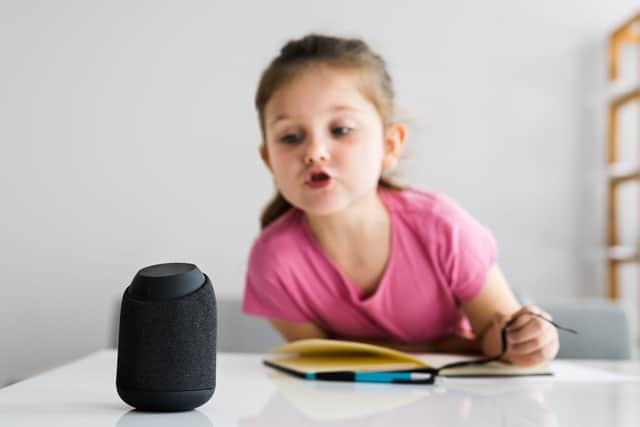Is Alexa making children rude? Scientists studying impact of voice-control devices
But the rapid rise in the likes of Google Home, Amazon Alexa and Apple’s Siri, has prompted researchers to question whether there are psychological impacts on users.
In particular, smart devices could have “long-term consequences on empathy, compassion and critical thinking” among children, they said, as they called for more studies to examine the impact on youngsters.
Advertisement
Hide AdAdvertisement
Hide AdChildren can use these tools in a number of different ways, with examples given by researchers including acting as reading companions to improve reading skills and as conversation “partners” to help children improve their communication skills by challenging verbal mistakes.


But they said that the artificial intelligence driving the devices, coupled with the human-sounding voices, have attracted concerns about how they “may negatively affect children’s cognitive and social development”.
In a new article, published in the journal Archives of Disease in Childhood, academics said the concerns on the impacts of children include “inappropriate responses”, “impeding social development” and “hindering learning opportunities”.
Ananya Arora and Anmol Arora, from the University of Cambridge, said there have been concerns that children “over-anthropomorphise digital devices”, meaning they attribute human characteristics and behaviour to the devices, which is compounded by some of the language used to turn on the devices.
On the other hand there is not an automatic expectation for children using the devices to say please or thank you, nor any consideration to tone of voice by the user.
“The lack of ability to engage in non-verbal communication makes use of the devices a poor method of learning social interaction,” they wrote.
They highlight the “magic word” function on Alexa – which uses positive reinforcement for polite manners – as an “important step in the right direction”.
On learning opportunities, the authors question whether the instantaneous response to any question could “hinder traditional processes by which children learn and absorb information”.
Advertisement
Hide AdAdvertisement
Hide AdThey said the process of searching for information is an “important learning experience” which teaches critical thinking and logical reasoning.
But they said this concern is not new as similar opinions were raised when the internet and search engines became widely available.
“The rise of voice devices has provided great benefit to the population,” they wrote
“Their abilities to provide information rapidly, assist with daily activities and act as a social companion to lonely adults are both important and useful.
“However, urgent research is required into the long-term consequences for children interacting with such devices.
“Interacting with the devices at a crucial stage in social and emotional development might have long-term consequences on empathy, compassion and critical thinking.”
Commenting, Dr Amy Orben, programme leader track scientist at MRC Cognition and Brain Sciences Unit, University of Cambridge, said: “This academic paper does not provide any novel evidence about the impact of voice assistants on children.
“It is an opinion piece, and its argument rests largely on news reports and anecdotal evidence, citing extremely little scientific evidence.
Advertisement
Hide AdAdvertisement
Hide Ad“Most concerns that are highlighted by this article are only backed up by news reports, and not by scientific evidence. Scientifically, little is known about the impact of voice assistants on children.
“The impacts of voice assistants are probably mixed and very dependent on how they are used by children.”
Comments
Want to join the conversation? Please or to comment on this article.